‘Ibiza is getting out of hand’: How the party island became the backyard of the mega-rich
Capri. St. Tropez. Now Ibiza. The tourism industry is flourishing in the third most expensive destination in the Mediterranean but the flow of wealth threatens to displace almost everyone else
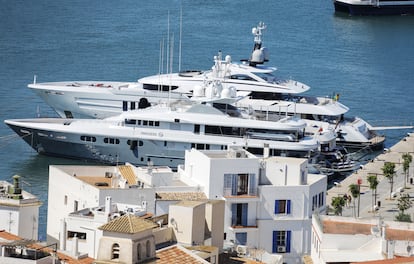
Nacho Lezcano lived in a Buddhist center in Madrid. He lived an austere life, and he had an almost allergic sense of detachment from material goods. Then the Argentine singer found himself catapulted into the center of European luxury. He had been hired by Lío, a combination restaurant-club-cabaret overlooking the bay in the port of Ibiza, a place where champagne flowed amid festive fanfare. The average consumption per table was between $500 and $600. A single bottle could go for the cost of an apartment in a midsized city. In 2019, a client bought a 30-liter Armand de Brignac Brut Gold for $130,000. Among the establishment’s regulars are celebrities like Cristiano Ronaldo, Leo Messi, Anne Hathaway and Justin Bieber. It is one of the most expensive restaurants in Ibiza, and one of the most popular.
“It was a huge contrast. Never in my life had I witnessed that level of excess. It was wild,” Lezcano says now. The 36-year-old remembers one night in particular. His boss had warned him that there would be a small surprise after the musical number. The directors of a Spanish fashion group wanted to give a gift to the company’s president. The lights in the restaurant dimmed. On the waters of the port, a yacht lit up. “It went around the bay and docked behind the stage,” Lezcano remembers. “That was the gift. A yacht. I came from living a fairly simple life in Madrid for 11 years; it left me in shock.”
It is said that Ibiza has many faces. Its hedonistic party scene often silences the rest: according to a 2019 report by the University of the Balearic Islands, clubs make up 35% of both the island’s gross domestic product and its workforce. But the island has other aspects. One is the relaxed and remote environment in the north, where a network of dusty roads leads to small towns of whitewashed houses. Then there is the hippie and alternative Ibiza, which began to take shape in the 1970s when the rebellious children of wealthy families took up residence on the island.
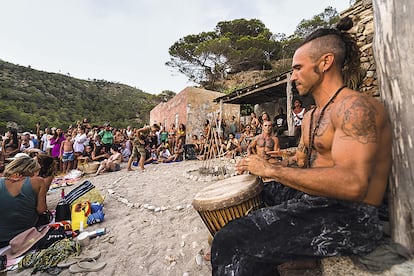
That Ibiza has been recycled into a boho-chic ethos, which permeates the island in the form of spiritual retreats and yoga classes. One more Ibiza exists: a traditional community untainted by the expectations of tourists. Its inhabitants worry about making ends meet in a municipality with the most expensive housing costs in Spain. The residents remain when the visitors go into hibernation during the off-season. And each year, when tourism slows, they begin to wonder where the island is going.
These worlds unfold in parallel, often without touching, perhaps coinciding in line at the supermarket or in the crowded Can Misses hospital in the southeast. But they are all affected similarly by the presence of enormous amounts of money. Ibiza has opted to attract extreme luxury, a conscious and strategic bet that threatens to engulf everything else.
According to a study carried out by property website Fotocasa, the cost of a square meter in the Balearic Islands has reached its historical maximum, both for rent and for sale. Its sale price is $3,184 (compared to the Spanish national average of $1,988) and is rented for almost $14 (compared to $11.3 nationally). According to a study carried out by El Diario de Ibiza, the island is the third most-expensive destination in the Mediterranean, behind only Saint-Tropez and Capri. The report places the average price on a weekend in June at $400 per night. This greatly limits the lodging options for seasonal workers. Dozens of them are forced to camp in the woods, where they settle until they are evicted by the police, a situation that is repeated every year.
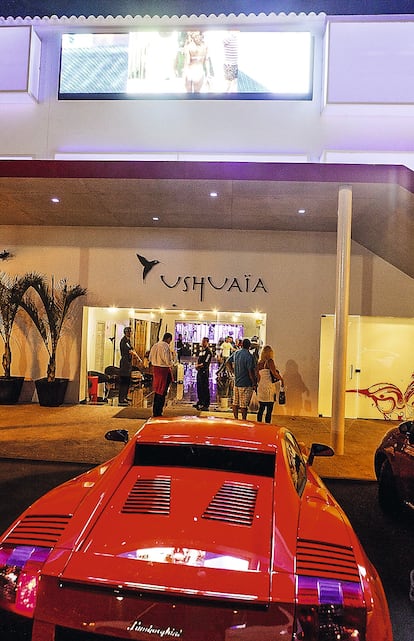
In 2017, one of the most popular beaches for watching the sunset, Benirrás, lost its mythical drum circles. The musicians who gathered to play at dusk realized that the nearby restaurants were cashing in on the show. They demanded their share, and they went on strike to get the hoteliers to pay them a weekly salary. No agreement was disclosed to the press, but two weeks later the drums began sounding again, while the mojitos ($12 a glass) and the champagne sangria ($110 a pitcher) flowed.
This year, Russian tourists have been notably absent. They have been replaced by the Dutch (whose presence has increased by 20%) and Belgians (10%). Some, to take advantage of remote working, have extended their stays. Nightlife spots “have managed to match the revenue of the year before the pandemic,” according to José Luis Benítez, representative of a group of nightclubs on the island. But that paints only part of the picture. Long ago, luxury here went from the dance floor to the gym.
UK tabloid The Daily Mail recently called Ibiza “a Notting Hill on the sea,” narrating its mutation from clubbers’ paradise to a magnet for wealthy eco-bohemian types from the London neighborhood. “There are said to be more yoga instructors per square mile in Ibiza than any other holiday destination on the planet,” the article notes.
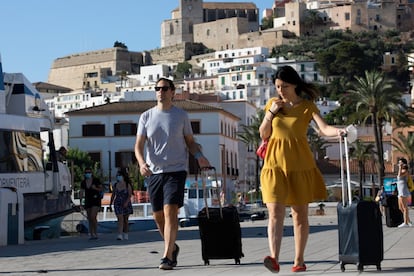
But not everyone sleeps well in this Xanadu of well-being. When we spoke with Carlos Martorell, for example, he hadn’t slept a wink. He woke up to a Lamborghini roaring under his house in the early hours of the morning. More than the noise, he is annoyed by the absurdity of it. “I understand that you might come here with a 4x4, but with a Lamborghini? Really?” He says over the phone. The highway that connects Ibiza and San Antonio has a small section of about 3,000 meters where drivers can reach 120 kilometers per hour – the only place on the island where such speed is allowed. Everything else is back roads and dusty tracks. “There’s a lot of nouveau riche, a lot of tacky billionaires,” says Martorell, a local public relations man, who has lived here since the 1960s when he was a friend of Andy Warhol. “I am glad that the island, which was very poor, is doing well. But prices are getting out of hand. This year the number of private planes, of very expensive restaurants, is crazy.”
Martorell is quite critical of this type of luxury – somewhat ironically so, as he is an ambassador of Ibiza Luxury Destination, a title granted by the association of Ibizan businessmen to encourage high-end visitors. This dichotomy is shared by many inhabitants: they know that tourism, especially that of the wealthy, has lifted Ibiza out of poverty, but they are aware of its excesses. Being the playground of the 1% has consequences. Not all of them are positive.
The height of luxury in Ibiza can be found in VIP zones. These have become the true economic engine for clubs, providing constant cash flow. The entry price varies depending on the club or the event. “People can pay between $5,000 and $50,000 per table, depending on how attractive the party is,” says Sheila Martínez, who in recent years has worked as a VIP room manager at a well-known club on the island. “There are exorbitant prices. Customers often stay for a couple of hours and leave the bottles full,” she points out.

Martínez knows the side effects of this type of tourism. “Everyone wants to earn money in the few months that the season lasts, and on many occasions, it becomes ridiculous,” she admits. Even so, she looks for the positive side. Life in Ibiza is expensive but fun, and it harbors surprises. Martínez has been here for ten years, since moving from her native Barcelona. She continues to speak of Ibiza with the reverence of a new love.
It is something common to many interviewees. They speak of The Island in capital letters, as if Ibiza had its own personality, mystical and benevolent. Adoptive Ibizans romanticize the locale. “When you arrive, Ibiza embraces you or expels you,” they repeat like a mantra. But this is based on an erroneous premise. Many Ibizans do not come to the island, they are born on it. And it is not Ibiza that throws them out, but speculation.
That was the case with Alicia Hurtado, a 36-year-old Ibizan who emigrated to the US in 2021. Luxury, for her, means access to basic services. In Ibiza, that is not always easy. “My mother is sick and she has to go to the doctor in Palma, because the oncologists here are always changing,” she explains over the phone. The region lacks doctors and public workers. Police, medical and civil service unions have organized a series of demonstrations.
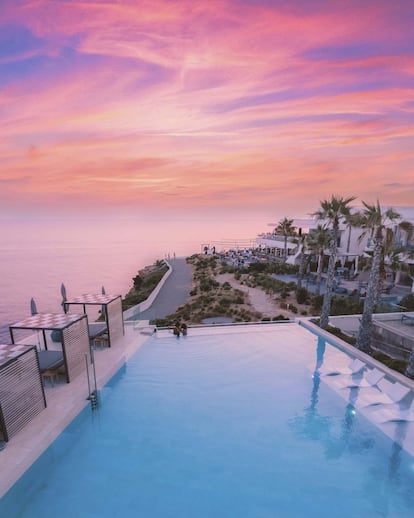
“Many jobs were left empty,” says Hurtado, a teacher. Tired of a place that has surrendered to tourism, she now returns to her native island in summer only to see it becoming more saturated, more expensive. and more luxurious. “From the outside, it seems that they rape it every season. They blow it up with cars, people and speculation.” And, during the pandemic, that explosion experienced only a brief pause.
Juan Serra has long been aware of such issues. In the decade he has spent on the island, he has specialized in the management of exclusive villas. These can cost $90,000 a week. “The richest people in the world are fighting to come here,” he says. Models, singers, businessmen, actors: Serra doesn’t give names, but he provides anecdotes: $600 bottles of champagne poured out in water fights and gargantuan meals that go to waste, with shellfish solidifying in the sun and meat covered in flies. He talks about the municipal police looking for side gigs doing private security at parties, of $60 million yachts anchored near town in case their owner decides to go sailing and wants to save the trip to the port.
Serra narrates these scenes with administrative coldness. “It is what feeds us to get us through the rest of the year. Otherwise we couldn’t do it,” he explains. The height of summer allows many to survive the quiet of winter. All the Balearic Islands are experiencing a boom, but while Mallorca features urban tourism and cycling for the cold months, in Ibiza and Formentera, there is hardly a place to go when the last nightclub closes its doors.
Ironically, these imbalances bring a certain equilibrium to Ibiza, a constantly changing place full of extremes. Its different faces may be influenced by a common evil, but that, ultimately, keeps it afloat. The critiques are legitimate but not unanimous. They make up a chorus of dissonant voices, but they all repeat the same refrain: the island is changing. It has been changing since it became fashionable in the 1960s. The Ibiza trend has not passed but it is reinventing itself, attracting a new type of public with each mutation. First it was the hippies, then the clubbers. In recent years, the mega-rich have joined. None of the previous groups has been totally displaced: none has wanted to leave Ibiza. Rather, they have spread out across the island, living side by side, creating small social archipelagos. The groups shape the different faces and masks of Ibiza, an island that embraces and expels, sometimes at the same time.
Tu suscripción se está usando en otro dispositivo
¿Quieres añadir otro usuario a tu suscripción?
Si continúas leyendo en este dispositivo, no se podrá leer en el otro.
FlechaTu suscripción se está usando en otro dispositivo y solo puedes acceder a EL PAÍS desde un dispositivo a la vez.
Si quieres compartir tu cuenta, cambia tu suscripción a la modalidad Premium, así podrás añadir otro usuario. Cada uno accederá con su propia cuenta de email, lo que os permitirá personalizar vuestra experiencia en EL PAÍS.
¿Tienes una suscripción de empresa? Accede aquí para contratar más cuentas.
En el caso de no saber quién está usando tu cuenta, te recomendamos cambiar tu contraseña aquí.
Si decides continuar compartiendo tu cuenta, este mensaje se mostrará en tu dispositivo y en el de la otra persona que está usando tu cuenta de forma indefinida, afectando a tu experiencia de lectura. Puedes consultar aquí los términos y condiciones de la suscripción digital.









































